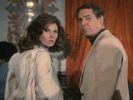Eye For Film >> Movies >> The Invisible Man (1975) Film Review
Since it's publication in 1897, HG Wells' The Invisible Man has become the loose template for a number of adaptations on screens both big and small. James Whale's straight take The Invisible Man (1933), John Carpenter's yuppie comedy Memoirs Of An Invisible Man (1992) and the oo-er missus shenanigans of The Erotic Adventures of the Invisible Man (Rolfe Kanelsky, 2003) have, among others, spun Well's initial concept into films and TV series with only fitfully successful results.
This mid-Seventies TV series, created by Harve Bennett and Steven Bochco, enlisted the aid of David McCallum – one of the stars of cult hit The Man From U.N.C.L.E. - to embody the role of Daniel Westin, the titular disappearing act. McCallum was joined by series regulars Melinda O Fee as Westin's scientist wife, Kate, and Craig Stevens as the Westin's boss Walter Carlson, head of the KLAE Corporation for whom they all work.

Released on DVD for the first time by Acorn Media UK, Bennett and Bochco's venture into Wells territory ran for only one season, comprising a feature length pilot and 12 stand-alone episodes. This fact speaks for itself, as the series wasn't a hit with either the TV execs or viewing public, and it's not hard to see why. After a promising pilot – a brooding tale of science gone awry, existential angst, shadowy Government agencies and moral/ethical betrayal – with Jackie Cooper (rather than the all together more avuncular Stevens) as a menacing version of Walter Carlson, Bennett and Bochco took the series proper into far less satisfying territory.
The jettisoning of the pilot's dark tone in favour of lighthearted adventure, and Cooper's replacement by Stevens, immediately robbed the series of its major plus points. What was a story of both the psychological and military-industrial implications of being, and being in control of, an invisible man – an intriguing concept for a serious science fiction series – in the pilot, is quashed. Instead, we're given run of the mill good guys vs bad guys narratives, as the Westin's become the KLAE Resource, a top secret team foiling all manner of nefarious schemes. The dilemma of how to cater for a lead character who is absent from the screen for lengthy periods of time is another major failing. Endless shots of empty interiors where we know Westin is rapidly becoming stultifying, and the visual tricks – which actually involve visible strings lifting an object the invisible Westin is carrying at one point – rapidly lose even the faintest trace of nostalgic charm. The rudimentary green-screen special effects that allow for Westin to disappear when he removes his specially constructed face mask and fake hands can't have been all that impressive back in the 70s, let alone viewed retrospectively.
Only a couple of the dozen episodes – namely Man of Influence and Power Play – are anything other than tedious, and only Fee's game performance as Kate – witty, sparky and energetic – provides any consistent source of entertainment. McCallum's characterisation of Westin is as lacking as his unmasked self – largely I presume due to the shallowness of the writing – and the affable Stevens is a non-entity as Carlson in comparison to Cooper's sly, hard-nosed performance. It's hard to see who this release will really appeal to as even the most rose-tinted viewer able to remember the show's original broadcasts will be hard pushed to claim this as anything other than a huge misfire in pretty much every respect. Contemporary audiences raised on the likes of BSG, Lost, The Wire and Breaking Bad won't get further than the first episode.
Reviewed on: 08 Jul 2013



















